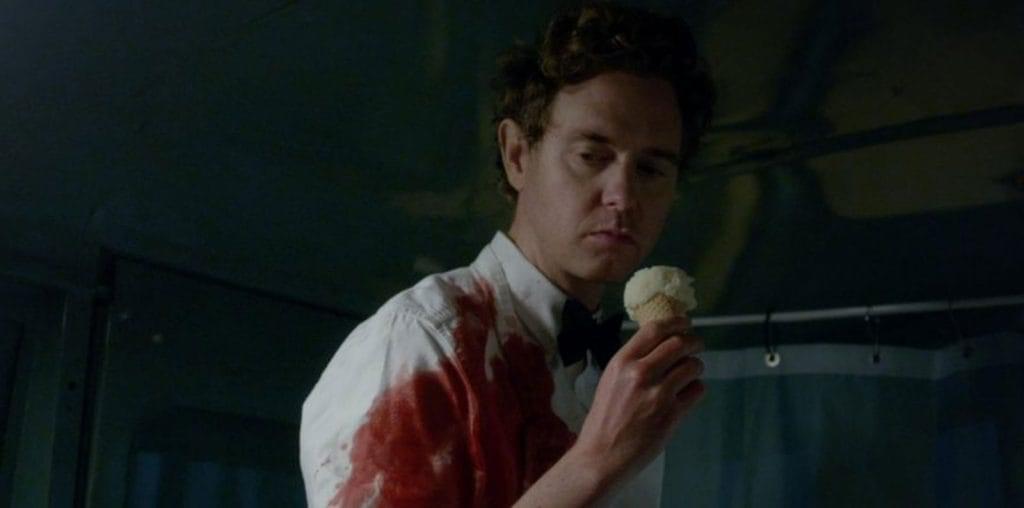
Stanley Kubrick’s The Shining (1980) 4 stars
Directed by Stanley Kubrick
Written by Stanley Kubrick & Diane Johnson
Based on the book by Stephen King
Cast: Jack Nicholson, Shelley Duvall, Danny Lloyd and Scatman Crothers
Stephen King’s The Shining (1997) 2 stars
Directed by Mick Garris
Written by Stephen King based on his book
Cast: Steven Weber, Rebecca De Mornay, Courtland Mead and Melvin Van Peebles
There’s an almost natural smugness that people feel towards a screenwriter whose only experience is adapting books by other authors. He’s rarely thought of as much more than a translator. Going by what passes for movies lately the criticism can be valid; a lot of the writers churning out scripts these days are either untalented or lazy. However, no matter what kind of skill or effort is put into the task, the reality remains that most books are a real bitch to adapt and even good writers have thrown their hands up in disgust while trying to make it work. On the surface, it looks simple enough. Just take scenes and dialogue, then translate them into screenplay format, right?
That may work for something like Elmore Leonard novels, most of which are written with such minimalist genius that they very nearly are screenplays unto themselves, but try to do the same with something a bit more “bookish” like Lord of The Rings and you’ll find out real quick just how much work it really is. It may not look it, but Peter Jackson did a whole hell of a lot of rewriting there.
So I’m not a book-to-movie snob. You’ll never automatically hear me say, “The book was better” and then make the smarmy face of the litterati. No, I think books and movies are different and equally artistic mediums. Which brings us to The Shining. There are two adaptations out there. One which is stripped down almost to nothing and the other which is exhaustive in it’s attempt to replicate the source text. I thought it would be interesting to compare the two and the methods used to create them.
PREFATORY MATTERS (AKA: THE STORY):
Both movies are about The Torrance family: Jack, Wendy and Danny, moving into the haunted Overlook Hotel for the winter to serve as its caretakers. The hotel is miles away from any help and the only road leading to it will be impassable for months. It’s a tough job, but who better to give it to than an alcoholic with a history of violence?
Beyond that, each film has a different idea about what to do with this story. Kubrick’s movie is about insanity and cabin fever, while the King miniseries is about how alcoholism can drive a good man to commit heinous acts of violence.
For King, the Overlook is a big metaphorical bottle of malt liquor. Jack Torrance is trapped inside and it’s influence is making him do things that he’d never do otherwise; making him see his family as an enemy and making him feel like they (instead of the alcoholism) are holding him back. The hotel even tells him that Danny is special and that it wants his son more than him, prompting Jack to all but yell, “You think you’re better than me boy???” during the violent conclusion.
The Kubrick version can likewise be seen metaphorically, but it’s metaphors are more numerous and harder to interpret. They run the gamut from the duality of man to the exploitation of the Native Americans, depending on how deep you want to dig through the clues. Alcoholism is mentioned, but in such an offhand manner that it gives us the impression that drinking is more of a symptom than a cause for Jack Torrance’s behavior.
THE DIRECTORS:
STANLEY KUBRICK: One of a handful of people in the history of cinema who was able to walk the very thin line between the art house and the mainstream and end up with movies that, for the most part, were a skillful melding of the two.
With “The Shining”, we find Kubrick at his most “fun”. Unlike everything else he ever made, “The Shining” was supposed to be a crowd pleaser and a hit. Kubrick doesn’t dumb it down or anything, but he’s not actively trying to appeal only to film connoisseurs either. If any of his movies could be called mainstream, it’s this one.
MICK GARRIS: Say what you will about Garris, but of all the directors to work on Stephen King adaptations, he’s one of the very few to get the feel of the books down pat. Read The Stand, then watch the Garris directed miniseries of the same name and tell me I’m lying.
Garris’ directing technique is to complement the screenplay he’s filming with some of his ideas rather than try to force his vision on it. So he was an obvious choice for director if King wanted to make a painstakingly faithful adaptation of The Shining.
The story continues in part two of THE SHINING VS. THE SHINING>>>


Jack made it a one man movie and he was fantastic. I remember how disappointed I was in the movie because it wasn’t the book. I’ve always preferred Kings version because it is the book. Jack was over the top which made for a great movie as a stand alone version. Kings version is great because it’s played with more subtlety and the characters are much more likable and the plot more pure.
Kubrics movie is a showpiece for Nickleson alone.